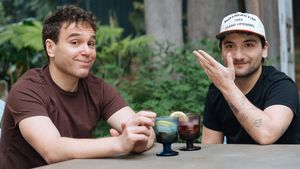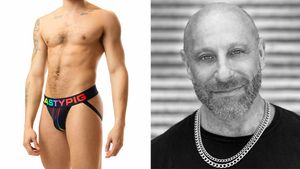I'm sure there's
some relationship between our recently skyrocketing
maternal hormones and the familial milestone thrust upon us
this week. Yesterday, against his mother's wishes, my
son Calvin had the audacity to start kindergarten.
He marched into
class with his new backpack and haircut like some
autonomous being ready to take on the world. Not
surprisingly, I was the more neurotic half of our
parental unit. I called Kim at work ready to discuss
the benefits of homeschooling.
Before Kim
entered our lives, Calvin and I formed our own microcosm. I
can scarcely remember a time when I wasn't wiping noses and
concocting kid-friendly lunches. Letting go is
especially bittersweet for me because I'm losing not
only my baby but my ability to protect him from the real
world.
Kindergarten
marks an entrance to the public sphere and an exit from the
safe haven of home. With grade school comes new elements
like bullies, school-yard fights, and the horrors of
social cliques. From here out, Calvin's physical and
emotional well-being will be increasingly out of our
hands--at least for four to six hours a day. And
sooner or later, out on the playground or in some
pint-size bathroom, my baby boy will confront his
first taste of homophobia.
In honor of these
inevitable challenges, I would like to pass along three
indispensable suggestions from other queer parents who have
already muddled through the process:
Talk to your kids...before someone else does.
This might seem
obvious, yet many of us handle these moments reactively
instead of proactively. Sure, we've got the perfect retort
crafted for when questions finally arise, but why
wait? There is a big difference between scaring our
little ones and helping them to feel good about their
family. Let your child know what to expect and how they can
assert themselves. Practice responses that will let
your youngster feel proud and in control of scary
moments.
Once is never enough.
Having a
proactive chat about homophobia is important, but children
are constantly hitting different social and
developmental milestones. As with all issues, their
questions will vary according to their awareness and
ability to comprehend complex answers. An explanation to
your 4-year-old will be completely different from
a conversation with your fifth grader. Consider which
aspects of your sexuality your child should hear about
and prepare age-appropriate explanations that you are
comfortable discussing.
Starting school means making new friends (this
means you too).
Once our kids enter kindergarten, we have less control over
whom they interact with. To help offset any negativity
your child might be feeling about his or her family
structure, challenge yourself to cultivate
relationships with more LGBT parents and children, even if
it means you need to reach outside your social
circle to resources like support groups.
Spending time with other kids who have two mommies or
daddies will help remind children they are normal.
Fortunately, our generation has decades of research
confirming that kids of queer parents reach
adulthood no more messed up than those with
straight parents. Calvin may face antagonism and
prejudice, but studies suggest he'll grow up more
open-minded and tolerant than his peers. That's great
news, though it won't help me beat the
first-day-of-school blues. So, if you'll excuse me, I have a
peanut butter and jelly sandwich to make, and a
gigantic mommy hug to give.


















































































